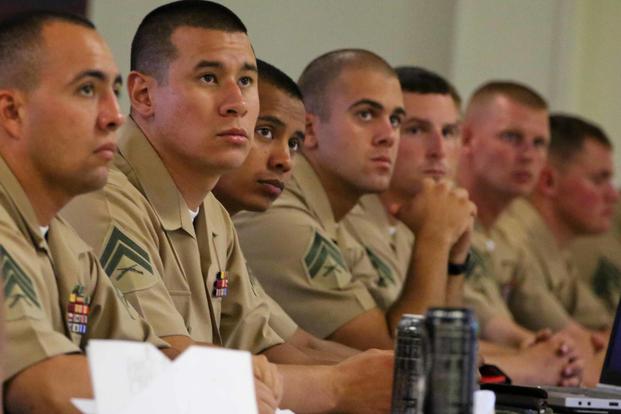Sailors and Marines could soon be eligible for real-world college credit for all that classroom time they put into career training and professional military education.
Navy leaders are pushing to stand up the new Naval Community College by 2021. The school will offer Marines and sailors free associate's degrees and college credits that are easily transferable to accredited schools across the country, said John Kroger, the Navy's new chief learning officer.
Kroger has been on the job for only a few weeks, but he's already on a path toward standing up the school. It is one of several ways Navy Secretary Richard V. Spencer wants to shake up his sailors' and Marines' education programs.
"I think it's completely transformational," Kroger said of the Naval Community College. "I think it's going to help with recruiting because we're entering an era where the idea of community college [being] free ... is spreading through the States.
Related: Navy Cracking Down on Tuition Assistance Eligibility
"I think it's really important that we be able to say, 'Look, we know you have that opportunity in the civilian world. You have that opportunity here too.'"
Degrees could range from computer science to history or data analytics, said Kroger, who served as an enlisted Marine before earning his bachelor's and master's degrees from Yale University, as well as a Harvard law degree.
The college will professionalize the fleet as weapons and communication systems get more complex, he said.
"We're going to need to tap the full potential of our enlisted force," Kroger said.
Here's how the new Naval Community College is likely to work.
Transferable Credits and Degrees
The Navy is looking to partner with colleges and universities that already offer strong associate's degree programs, Kroger said. And when assessing whether to choose them as partners, it will be looking for specific criteria.
"We want to make sure that it's a fully accredited institution and that we're granting degrees that will be respected by civilian universities ... when it comes time to transfer credits," he said.
Crediting Existing Training
In sitting in on some PME courses at the Marine Corps University and other Navy Department institutions, Kroger said it's obvious collegiate-level learning is already happening in the sea services.
And he wants Marines and sailors to be able to earn certificates or credits toward an associate's for stuff many of them are already doing.
"I think some sailors and Marines would be surprised at how much college credit they should be accruing going through the current training they're already doing," he said.
Flexible Programs
It can be tough for troops to finish a traditional college education when they're constantly being sent off to train or deploy. Courses at the Naval Community College will have built-in flexibility that will allow Marines and sailors to pick up the work when they're able.
"If you were taking a civilian class and you're deployed in the middle of it ... then you have to start over when the class is offered again," Kroger said. "We're going to have to work with our partners on units that can be done in ways with greater flexibility so when sailors and Marines do have the time, they can focus on their education and, when their operational responsibilities make that impossible, they can put that on hold for a moment and come back to it without having gone backward."
Online and In-Person
Naval Community College isn't going to be a traditional campus experience. Most of the work will be done online, but Kroger hopes to offer a selection of in-person courses in places with high sailor and Marine populations.
"I can imagine [Naval Station Norfolk in Virginia] or [Camp Pendleton, California] eventually having something that looks more like a traditional classroom," the chief learning officer said.
Retroactive Degrees?
A big question remains for those who just left the service with a bunch of PME and MOS training: Will degrees be available to them, too?
For now, Kroger said he's primarily focused on the active-duty force -- or those about to leave it.
"If a sailor or Marine decided not to reenlist 85% of the way through a degree, we're going to want to have a transitional period of time after the termination of their enlistment to try to help get them finish," he said.
-- Gina Harkins can be reached at gina.harkins@military.com. Follow her on Twitter @ginaaharkins.
Read more: Air Force Want to Make its Moves More Stealthy By Hiding in Plain Sight













